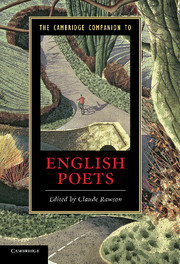Book contents
- Frontmatter
- Introduction
- 1 Geoffrey Chaucer
- 2 Thomas Wyatt
- 3 Edmund Spenser
- 4 William Shakespeare
- 5 John Donne
- 6 Ben Jonson
- 7 George Herbert
- 8 John Milton
- 9 Andrew Marvell
- 10 John Dryden
- 11 Jonathan Swift
- 12 Alexander Pope
- 13 William Blake
- 14 Robert Burns
- 15 William Wordsworth
- 16 Samuel Taylor Coleridge
- 17 George Gordon, Lord Byron
- 18 Percy Bysshe Shelley
- 19 John Keats
- 20 Alfred Lord Tennyson
- 21 Robert Browning
- 22 Emily Brontë
- 23 Christina Rossetti
- 24 Thomas Hardy
- 25 William Butler Yeats
- 26 D. H. Lawrence
- 27 T. S. Eliot
- 28 W. H. Auden
- 29 Philip Larkin
- Further Reading
- Index
2 - Thomas Wyatt
Published online by Cambridge University Press: 28 May 2011
- Frontmatter
- Introduction
- 1 Geoffrey Chaucer
- 2 Thomas Wyatt
- 3 Edmund Spenser
- 4 William Shakespeare
- 5 John Donne
- 6 Ben Jonson
- 7 George Herbert
- 8 John Milton
- 9 Andrew Marvell
- 10 John Dryden
- 11 Jonathan Swift
- 12 Alexander Pope
- 13 William Blake
- 14 Robert Burns
- 15 William Wordsworth
- 16 Samuel Taylor Coleridge
- 17 George Gordon, Lord Byron
- 18 Percy Bysshe Shelley
- 19 John Keats
- 20 Alfred Lord Tennyson
- 21 Robert Browning
- 22 Emily Brontë
- 23 Christina Rossetti
- 24 Thomas Hardy
- 25 William Butler Yeats
- 26 D. H. Lawrence
- 27 T. S. Eliot
- 28 W. H. Auden
- 29 Philip Larkin
- Further Reading
- Index
Summary
In the Egerton manuscript, the poet and diplomat Thomas Wyatt begins a poem in his own hand:
Prove whether I do change, my dear,
Or if that I do still remain
Like as I went or far or near,
And if ye find…
The earliest texts of Wyatt’s poems come to us in several manuscripts and two books published after his death; the Egerton, with some poems in his hand, is the most authoritative of the manuscripts. The poem was not completed in any extant manuscript, and – because it cuts close to the concerns that animate much of Wyatt’s work, speaking directly to preoccupations that appear more obliquely elsewhere – perhaps it could not have been completed. Across several ranges of experience, Wyatt’s poetry is engrossed with change. The poet’s life took place against the background of the turbulent first fifty years of the sixteenth century, when an Englishman born into Roman Catholicism became Protestant, the regime of Henry VIII adjusted English ambitions towards the world, and the empire of Charles V – to which Wyatt was Henry’s ambassador – absorbed the new reality of global reach. These historical factors, especially Henrician absolutism and the Reformation, show up everywhere in Wyatt’s poems, but they are not so much examined directly as braided with a deeply felt personal outlook. Wyatt’s understanding of the relations between persons is based on the conviction that men and women are profoundly unlike one another, with a sharp division of experience between them – their capacity to make entirely different meanings of common events such as love – and an utterly different orientation to change. To his jaded eye, the sexes might as well be different species, occupying adjacent but separate realities.
- Type
- Chapter
- Information
- The Cambridge Companion to English Poets , pp. 37 - 52Publisher: Cambridge University PressPrint publication year: 2011
- 1
- Cited by

